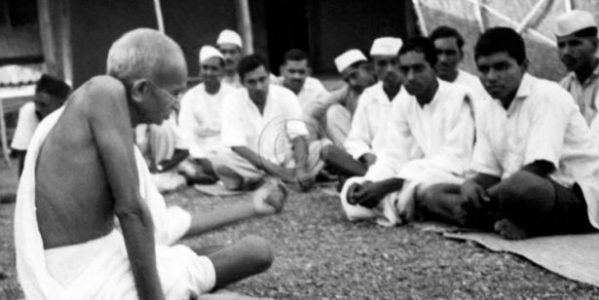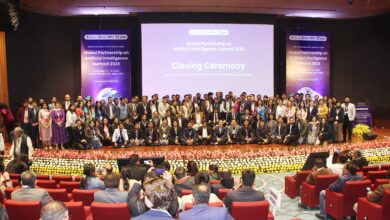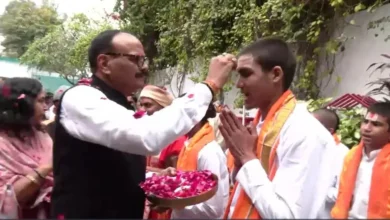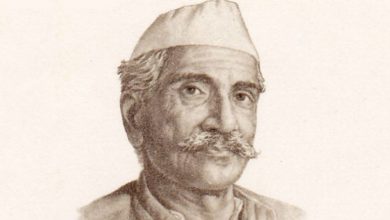Gandhian Concept of Human Equality: An Ideal Social Order to Resolve Conflicts
The Gandhian thought is based on the eternal truth. The reality of Indivisible Whole is at the root of Gandhiji’s ideas. It is, therefore, dedicated to the universal unity. Every creature, movable-immovable thing, and interdependence of all forms of life, thus, all falling under one unit is the ultimate truth of the universe. Due to the dedication to this eternal truth –ardent belief in this perpetual reality, the Gandhian ideas become profoundly sublime in practice and they outshine many similar thoughts developed in the world from time-to-time. This reality makes the Gandhian ideas all-timely significant if they are adopted in their most relevant form as per the demand of time and space keeping their basic spirit intact.
Connection of the Gandhian thought –Gandhi-Vichar with the truth of universal unity –Indivisible Whole and reality of interdependence of all elements of the universe could be well comprehended from write ups of Mahatma Gandhi himself, views he expressed from time-to-time publicly and statements he issued on various occasions. On almost all the occasions this truth could be realized predominantly latent in the statements of Gandhiji. In this regard, some of his ever-significant statements are worth quoting here.
About the universal unity –the eternity of Indivisible Whole, Gandhiji says clearly and nicely, “The forms are many, but the informing spirit is one. How can there be room for distinction…where there is this all-embracing fundamental unity underlying the outward diversity. For that is a fact meeting you at every step in daily life…the final goal of all…is to realize this essential oneness.” (Harijan, December 15, 1933)
Talking about the spiritual-moral law working at the universal level Mahatma Gandhi says, “I do not believe that the spiritual works on a field of its own. On the contrary, it expresses itself only through the ordinary activities of life. It, thus, affects the economic, the social and the political fields.” (Young India, September 3, 1925)
Mahatma Gandhi, accepting the reality of unity of men and all creatures, points out, “I believe in the essential unity of man and, for that matter, of all that lives.” (Young India, April 4, 1924)
About the unity of the whole of humanity Gandhiji has said, “Mankind is one, seeing that all are equally subject to moral law.” (Ethical Religion, p. 5).
He repeatedly mentioned about the truth of interdependence of all dimensions of life. In this regard his views appearing in Young India on March 2, 1922, in Harijan on December 24, 1938 and March 30, 1947, respectively, are worth-mentioning here. Gandhiji pointed out, “…Life being an Indivisible Whole, no line can be drawn between its different compartments (social, political, religious –even economic as all act and react upon one-another), not between ethics and politics” and “You cannot divide social, economic, political, and purely religious work into watertight compartments.”
Hence, the heart of the Gandhian thought as the reality of the Indivisible Whole –the universal unity, creature unity, more especially human unity is quite discernible.
This essence of Gandhi-Vichar not only reflects its firm belief in psychic equality of all beings originating from the One and the Same source, but also calls for cognate unity among men accepting the truth that man is, due to the possession of distinguished virtues like intellect and creativity, superior to all creatures. Along with this, Gandhi-Vichar also expects man to have active goodwill towards all life and work for the wellbeing of all with dedication. In brief, equality, especially human-equality remains in the centre of the Gandhian thought –Gandhi-Vichar and Gandhi-Marg. Along with getting everyone –woman or man realized about equality, bringing all human beings within the ambit of this, is the basic spirit of Gandhi-Vichar. This is, in my opinion, the first and the foremost fundamental of the Gandhian thought.
In principle, one accepts the equality of fellow beings. One, who is the believer of the authority of God –a theist, accepting the origin of all creatures from the One and the Same source, and the presence of Soul in everyone, recognizes the equality of all beings.
However, the situation in practice is not the same. In practice, it is very difficult for man to rise above all reservations and follow the principle of equality in life and treat fellow beings accordingly. Human vices like jealousy and competition, even if both these are transitory in nature, are hazardous to the self-realization of man.
They hinder the accomplishment of one’s wish to express equality with fellow beings in behaviours. These very vices are, in fact, the root cause of bitterness and hostility in all walks of life. They create the state of discrimination and injustice leading to enmity and conflict; further, they generate atmosphere of violent clashes –bloody confrontation in all areas of life, and even cause the wars.
As jealousy and competition are naturally present in man; these are connected with the reality of human life, therefore, avoiding difficulties, problems, obstacles and the state of conflicts is not possible. It is inevitable. Not only is this, but with continuously ongoing process of development, transgression in human temperament also increasing giving rise to moral and ethical degradation.
Gandhi-Vichar is, as I have tried to understand it, not even slightly deviated from this truth. Mahatma Gandhi was deeply familiar with the reality of human life. He was well aware of human nature and man’s inclinations, and temporary and permanent virtues. If he knew the power and importance of Ahimsa, which is the basic human virtue and an essential condition of existence and progress, and the pathway to achieve peace and harmony within and without as goals of life, he was also aware of evil-like tendencies that cause clashes and confrontations in society.
From minute study and prejudice free analysis of Gandhiji’s views regarding democracy, and a State dedicated to the Sarvodaya –the Ramarajya, this reality itself becomes apparent. Despite taking the society or the State completely free from problems, clashes or conflicts as his ideal, the Mahatma never said that it could be a possibility with certainty. In his own words, “If we continue to work for such a society (or a State) it will slowly come into being to an extent, such that the people can benefit by it.” In Continuation to this he said, “Euclid’s line is one without breadth, but no one has so far been able to draw it and never will. All the same it is only keeping the ideal line in mind that we have made progress in geometry. What is true here is true of every ideal.” (Harijan, September 15, 1946)
Hence, it is evident that Mahatma Gandhi called for achieving the goal through continuous endeavours. He emphasized the need of labour for the purpose. By doing so, if goal is not achieved completely, even then efforts would not be leftover. It is the truth that any effort done with dedication never goes waste; it may delay in bearing fruits to some extent, but the success is the natural reward of endeavours made with honesty and dedication.
The ideal of human equality may not be achieved entirely; each and every one in the society may not be brought within the ambit of complete equality, but pure hearted realization and efforts made for equality with honestly can never be unproductive. Only the work done for this –efforts made in this context, can pave the way to achieve the goal of equality of men to the maximum extent. Gandhiji, as a radical thinker –an advocate of the process of gradual change, which remains large scaled welfaristic also for long, not only believed in this fact, but he lived its true spirit in his life holding it firmly as one of the fundamentals his ideas. It is evident from his own views on all important subjects of life, his activities –Satyagrahas and constructive works. This fundamental makes the Gandhian ideas quite practical in resolving problems, conflicts and struggles caused due to inequality that prevails among men.
As mentioned already, Gandhi-Vichar accepts the inevitability of differences of opinions, confrontations and struggles among men causing violence in different forms. This state is natural and truth related to it cannot be denied. Despite this, Ahimsa is an eternal virtue of man –Atmikshakti (the soul-force); it is, therefore, the foremost and natural human virtue. Only non-violence –its supplementary values and non-violent activities are the means to get victory over evils-like vices –jealousy and completion; they are capable of paving the way to resolve problems. That is why; urging for the cultivation of Ahimsa according to its basic spirit at all levels in every walk of life Gandhiji called on man to make non-violence the basis of individual and mutual behaviours keeping human welfare as the nucleus. This call of Gandhiji gets one realized the spirit of equality among fellow beings and opens the door for equality-based human practices. It minimizes hostilities and leads to resolve disagreements, conflicts and struggles in a peaceful way.
Active goodwill towards all life and Nature
Active goodwill towards all life and Nature is the basic spirit of Ahimsa and intent underlying the act is the acid test of non-violence. All those who take Ahimsa as a momentary value, accepting this a subject of practice on particular occasions, take it lightly and consider it a weapon of the weak, they must understand that Ahimsa is a reflection of inner strength and has to be observed in thought, speech and action as a way of life.
Accepting Ahimsa as a fundamental –eternal and natural virtue of man, Gandhiji urged all in the world, general or elite, to cultivate it in practices, individual and mutual, keeping the large scaled welfare of humanity as the nucleus, which is, undoubtedly, possible. He also hoped for removing discriminations among men and resolving disputes and struggles on the basis of Ahimsa with a vision of establishing a society and the State dedicated to harmony and peace. In Gandhiji’s own words, “I have…tested the truth by experience that the primary virtues of mankind are possible of cultivation by the meanest of the human species. It is this undoubted universal possibility that distinguishes the humans from the rest of God’s creation.” (Harijan, May 16, 1936 and June 18, 1938)
Realization of equality, courage of accepting the truth of equality, and its embracing in behaviours –transformation in practices, is that universal truth, which generates the atmosphere surcharged with large scaled co-operation and co-ordination among fellow beings that are necessary for harmonious societies. An atmosphere instilled with co-operation and co-ordination can transform even the wildest state of violent conflict or a situation of war into peace. This is not an imaginary thought, but based on real life experiences of the practitioners. Gandhi-Vichar is based on this thought. This is one of the foremost aspects of the Gandhian thought.
Pages of thousands of years of history are before us to tell stories of terrible hostilities, violent conflicts, one after the other, and wars fought between two or more nations for long times –for decades. In going at the root of all such stories it fairly establishes that inequality, it could be in any form, eventually remained the cause of all hostilities, conflicts, violent struggles and wars. Not only this, solutions of all conflicts, struggles and wars could also be feasible keeping the spirit of equality in the centre at the time of stepping forward for the purpose. All peaceful ways or methods of resolutions, dialogues, discussions resulting in compromises, temporary or permanent, are, more or less, equality spirit-oriented process. The beginning of this process and implementation could be possible only on basis of reflecting the spirit of equality between the two parties or among the parties in a dispute, a clash or war, and embracing it in practices accordingly.
It was the reason that Mahatma Gandhi placed equality at the top of his ideas and activities or works. He firmly said that his central aim was the equal treatment for the whole of humanity (without any kind of discrimination) and that equal treatment meant equality of service. (Young India, March 12, 1925) The Mahatma worked for this purpose throughout his life on the basis of Ahimsa and called on the whole world to make all efforts to develop a culture of human equality. This aspect of Gandhi-Vichar makes it the most effective and relevant way of life, worth adopting all over the world.
*A Padma Shri and Sardar Patel National Awardee Indologist Dr. Ravindra Kumar is a Former Vice Chancellor of CCS University, Meerut; he is also the Editor of Global Peace International Journal.





